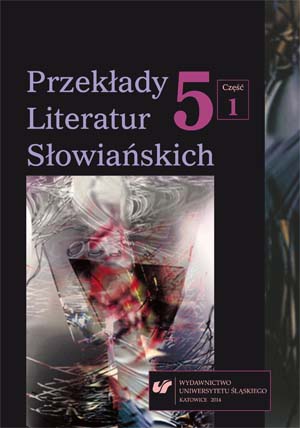Prevod in svetovna književnost / Literatura światowa a przekład
Translation and World Literature
Author(s): Marko JuvanSubject(s): Literary Texts
Published by: Wydawnictwo Uniwersytetu Śląskiego
Keywords: literary translation; world literature; literary systems; comparative literature; Goethe Johann W.
Summary/Abstract: Compared to the original production within national literary systems, literary translations are traditionally regarded of lesser importance, although it is through translating that the representative works of world literature have been introduced into these very systems (Eysteinsson). The translation is constitutive of world literature, be it understood either as an aggregate of literatures expressed in all the languages of the globe, the canon of “eternal” artworks of humankind, or as the global space of inter-literary relations. The presumed universality of world literature is always already inscribed in particular literary systems through different variants and perspectives articulated by translations, the latter representing the most prominent form of cross-cultural circulation of literature. Since cultural nationalism saw literature in the standard mother tongue as the pillar of national identity and the main evidence of the nation’s creative originality, literary translations were often discarded as mere derivatives restricted to the realm of cultural consumption. In the first half of the 19th century, however, the quality and richness of the translation repertoire began to figure also as quasi-international standards for evaluating to what degree the particular “national” language and culture were developed. As early as post-positivist comparatistics, the translation was treated as an important factor of international literary mediation (e.g. Ocvirk), but it is only the late twentieth-century translation studies that raised the reflection on translation to the level of theory enabling to ground a paradigmatic shift of methods for the entire study of literature, in national and comparative literary studies alike (Bassnett, Even-Zohar). The valorization of translation that is going on since the beginning of the 21st century has been decisively influenced by the global renaissance of Goethe’s "Weltliteratur". More than a decade after Ďurišin’s theory of the world literary system and based on the reinterpretations of Goethe’s notion of world literature, a new scholarly paradigm is in full swing that attempts to transcend national literary history, comparative literature, and postcolonialism (Lawall, Casanova, Moretti, Damrosch, etc.). However, the translation was of key importance already in the historical beginnings of the conception of "Weltliteratur", with which Goethe aimed at promoting humanist aesthetic cosmopolitanism, creatively reviving national literature and establishing German literature as a new hub of international literary life. The present article focuses on how experiencing translations had formed Goethe’s ideas of circulation and the self-reflection through otherness and how these ideas were recently reinterpreted by Damrosch and Thomsen. Juxtaposing works of various European and “Oriental” literatures (either in the original or in translation), Goethe reflected on his literary and cultural identity and discovered new...
Journal: Przekłady Literatur Słowiańskich
- Issue Year: 5/2014
- Issue No: 1
- Page Range: 15-51
- Page Count: 37

